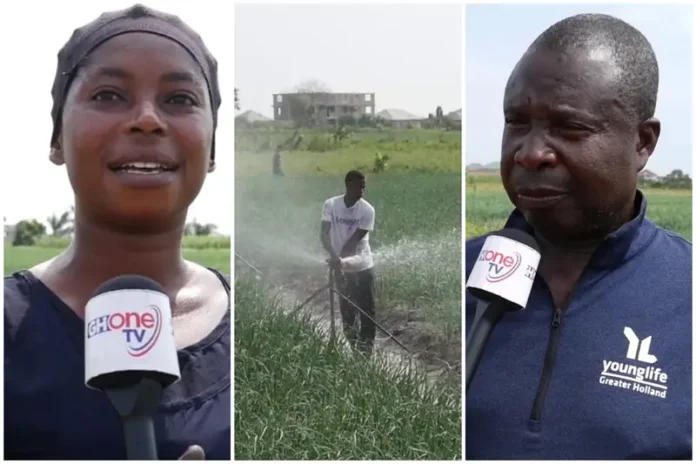The Tuba Irrigation Farmers Association is calling on the government to act urgently to rehabilitate the ageing Tuba Irrigation Scheme, which has served as a critical agricultural hub for over 40 years.
According to the association’s Vice Chairman, James Amankwanor Mensah, the deteriorating condition of the irrigation canals is threatening food production, jobs, and the survival of hundreds of farmers and labourers.
“The canals are choked, broken, and blocked by sand and debris. We keep spending money trying to fix them, but without proper rehabilitation, nothing changes. It’s unacceptable,” said Mr. Mensah in an interview with GhOne TV/Starr FM’s Hoenyefia Noah Nash during the reporter’s visit to the farm while harvesting of tomatoes.
He believes that a comprehensive renovation of the irrigation facility will result in higher crop yields, improved living standards, and a stronger local economy.
Farm Labourers: Farming is Our Lifeline
At the heart of the Tuba Irrigation Scheme are people like Sarah Addison and Afia Kamsin, two seasonal farm labourers who, despite being trained dressmakers, rely on farming for survival. For them, the scheme is not just about food it’s about dignity and daily bread.
“If I don’t work on the farm, there’s no food at home. My dressmaking isn’t enough,” Sarah said as she harvest tomatoes on 2.5 acres farmland in Tuba.
Afia added, “Sometimes I sew, but the orders aren’t consistent. The farm gives me weekly wages that help feed my kids and pay rent.”
The scheme currently supports over 230 registered farmers and employs more than 300 seasonal and permanent labourers, many of whom are women. These workers are paid daily or weekly and form the backbone of the food supply chain that feeds much of the surrounding communities markets and parts of Accra big market in the capital.
Traders Say: Tuba Keeps Prices Low
For many market traders, the Tuba Irrigation Scheme is a vital source of fresh and affordable produce. Rukaya, a tomato trader in Tuba Market, and Maabena, an Tomato seller in the Onion Market, both source their goods directly from the fields.
“I come to the farms myself to buy. Tomatoes from Tuba are cheaper, fresher, and help me make enough profit,” said Rukaya, as she sorted crates of tomatoes by size.
Maabena agreed, saying, “Tuba produce keeps my business running. If the canals break down completely, we will suffer, and prices will go up in the market.”
These traders are part of a larger network of local food vendors who depend on consistent supply from the Tuba Irrigation scheme. Any disruption to irrigation threatens not just farms but also food affordability in Tuba, surrounding towns and Accra.
A Forgotten Canal System: 40 Years Without Major RepairsThe Tuba Irrigation Scheme was established in 1983, with water drawn from the Densu River and the Weija Irrigation Dam. A 7 to 8-kilometre open canal was constructed to supply water year-round to support vegetable farming. However, despite its scale and impact, the facility has never undergone major rehabilitation.
“Since the 1990s, the canal has served us, but it has become fragile. Erosion, silt, and collapsed sections have made water distribution difficult,” Mr. Mensah explained.
During the dry season, water barely reaches the end of the fields. Farmers say they must sometimes carry water manually water the crops or abandon sections of their farms, leading to reduced productivity and financial loss.
Urban Farming as a Solution to Rising Food PricesUrban and peri-urban farming has become an important solution to food security in Ghana.
The proximity of Tuba to Accra makes it a key contributor to the city’s fresh produce market. Mr. Mensah believes that investing in urban irrigation systems like Tuba could ease the pressure on imported food, reduce transportation costs, and lower market prices for consumers.
“Urban farming is the way forward. If we can produce more food near our cities, we reduce the cost of food, reduce imports, and create jobs,” he said.
He urged the government not to overlook Tuba and other urban farming communities when planning agricultural investments.
The encroachment on most farmland has increase across the country. Land guard attack on farmland has increase due to the interest from the real estate company.
A Plea for Support and Recognition
Despite the current challenges, the farmers appreciate some of the support they’ve received. Mr. Mensah thanked the government for the recent fertiliser subsidy during the cropping season.
“We are grateful for the fertiliser support. Each farm got 20 bags fertilizer, and helped us start the season, but we still need more. Seeds, pesticides, tools and most importantly, the fertilizer,” he said.
Farmers are asking for a holistic intervention: one that includes rehabilitation of the reservoir and canal system, provision of farming inputs, and training for young people to continue the farming legacy in the area.
Looking Ahead: Can the Scheme Be Saved?
With thousands of livelihoods depending on the success of the Tuba Irrigation Scheme, the community is hoping their cry for help will be heard before the system collapses entirely. The cost of inaction, they warn, will be higher food prices, fewer jobs, and the collapse of a once-thriving local farming economy.
“We don’t need promises, we need action,” said Afia, as she headed back to the fields.
The Tuba Irrigation Scheme is more than a farming project; it’s a community, a source of sustenance, and a model of urban agriculture.
Its current state reflects years of neglect, but with timely government intervention, it could once again become a shining example of sustainable farming in Ghana. Until then, the farmers of Tuba continue to work their fields, hoping for the day when water flows freely again, bringing not just crops, but renewed hope.








